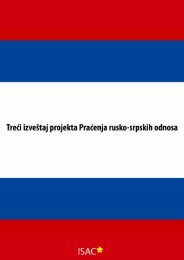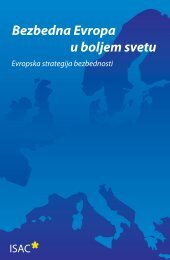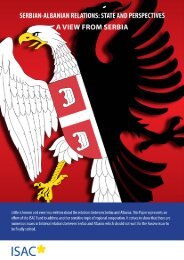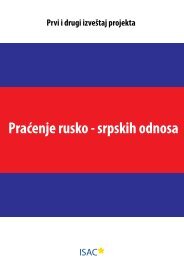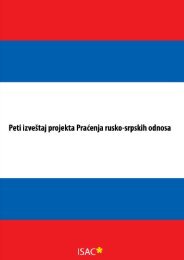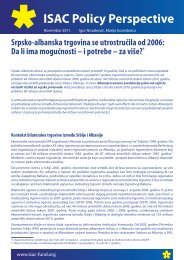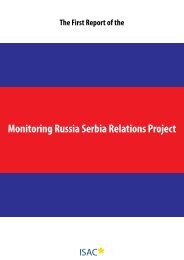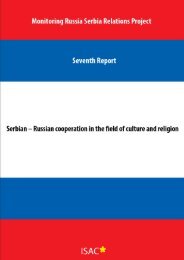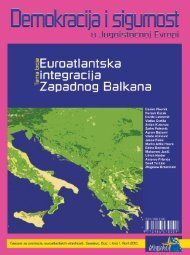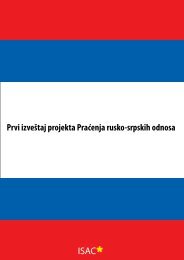MONITORING RUSSIA SERBIA RELATIONS - ISAC Fund
MONITORING RUSSIA SERBIA RELATIONS - ISAC Fund
MONITORING RUSSIA SERBIA RELATIONS - ISAC Fund
- No tags were found...
You also want an ePaper? Increase the reach of your titles
YUMPU automatically turns print PDFs into web optimized ePapers that Google loves.
In that sense, it is characteristic that in both dominant discourses a self-reception of Serbiaas equal with Russia prevails (as it is the case when comparing Serbia to some other"powerful" states - Germany, Britain, France...), which is actually quite an illusory one. 24Unlike Serbia - Russia and the Russian society experience Serbia and the Serbs in quite arational manner (an emotional or irrational attitude, if any, can be perceived in its attitude toMontenegro, while a specific attitude to Yugoslavia can be noticed among elderly Russians).Historical Framework of Russian-Serbian Relations and the Perception of RussiaThe complex three-century-long relations between Russia and Serbia, which have includedboth cooperation and patronage, but also confrontations and disharmony, are difficult toexplain and even more difficult to understand if they are viewed in simplified black andwhite stereotypical categories of "матушка", "a good protectress", or "an evil, despotic andtyrranical" Russia. One thing is certain - whenever, in the past three centuries, decisionshave been made on the fate of Serbia and the Serbs, Russia has always tried, in one way oranother, to participate in such decision-making, protecting its own vital interests as a rule(e.g. during the reign of Peter the Great, when the Serbs asked him to protect them from theTurks on one hand, and conversion to Catholicism, on the other, and even today, whenresolving the issue of the final status of Kosovo is on the agenda of the internationalcommunity).If we observe the general trends of the development of mutual Russian-Serbian relationsduring the three centuries, periods of close cooperation, patronage and protection, but alsoconflicts and confrontations, are clearly visible and so are several key points and events.Intensive Serbian-Russian relations in modern times started developing as early as towardsthe end of the 17 th century (although individual contacts dated back to as early as the MiddleAges), when the most eminent Serbs, led by Patriarch Arsenije III Crnojevic, asked RussianTzar Peter I The Great to help them liberate themselves from the Turks and when the Russiaof Peter The Great decided to embark on a more active policy in the Balkans (which, alongwith other reforms and changes of the epoch of Peter I, marked the beginning of its moreresolute battle for its place among the leading European states).During the 18 th century, the mutual relations were characterized by the fact that Serbs mostoften addressed Russia with a request to help them in their battle for liberation from theTurkish sway by military, political, educational, cultural, spiritual or financial means, andalso, as the Serb people, after the Viennese War and migrations under Patriarch Arsenije III,lived divided, i.e. in two states - Austria and Turkey - to protect them from Catholic pressureand attempts at converting them to Catholicism in the territories under the Habsburgs andthe Venetians. This was also the time of mass migrations of Serbs from the HabsburgEmpire to Russia, in 1724 and 1747, which were also instigated by the feeling of political,cultural and spiritual affinity. In that century, fighting with the Habsburgs for political24 It suffices to state just a few examples: Serbia spans 88,361km2 and Moscow and the Moscow district spans47,000km2; Serbia has a population of 7,479,437 (8,116,552 inclusive of Kosovo), while Moscow has10,126,424 (16,744,962 people inclusive of the Moscow district); London has a population of 8,278,251 in theurban zone, or 13,063,441 in the "broader" London and Paris has 10,142,977 in the urban zone, or 12,067,000inclusive of its suburbs; Novi Sad, the second largest town in Serbia, has 191,000 people (altogether 298,139in the wider territory of the town), while one of the Moscow regions alone, Certanovo, has 341,633inhabitants, etc.48



